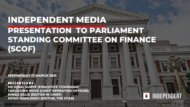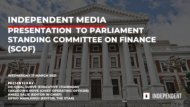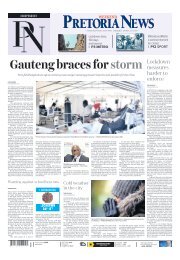PW_MAIN_E1_160520_ALL-1
You also want an ePaper? Increase the reach of your titles
YUMPU automatically turns print PDFs into web optimized ePapers that Google loves.
10 Saturday, May 16 2020 | PERSONAL FINANCE<br />
Clearing up the confusion about annuity products<br />
• ASSETS<br />
New legal<br />
position on<br />
living annuities<br />
on divorce<br />
A RULING this week by the Supreme Court<br />
of Appeal (SCA) has overturned the existing<br />
legal position on what happens to a living<br />
annuity on divorce. Although pre-retirement<br />
assets must be split between the two parties<br />
in a divorce, until now this has not applied to<br />
post-retirement assets in an annuity.<br />
Jenny Gordon, head of technical advice<br />
for investments, product and enablement<br />
at Alexander Forbes, says a 2016 ruling by<br />
the Johannesburg High Court that a living<br />
annuity cannot be taken into account for the<br />
purposes of calculating the assets on divorce<br />
was overturned on appeal by the SCA.<br />
The court ruled in the case of Montonari<br />
v Montonari that the right to the income of a<br />
living annuity formed part of the assets of a<br />
marriage for the purposes of divorce.<br />
The court ordered that “the value of the<br />
annuitant’s right to future annuity payments<br />
under a living annuity is an asset in his estate<br />
for the purposes of calculating the accrual in<br />
his estate”.<br />
Gordon says although the legal principle<br />
that a right is capable of valuation and<br />
capitalisation is sound, the practicalities of<br />
applying this to living annuity income is<br />
extremely difficult. This is because variables<br />
such as the investment return assumptions,<br />
the level of drawdown and the annuitant’s<br />
mortality had to be taken into account. It does<br />
also not change the fact that the income from<br />
the living annuity can still be paid only to the<br />
annuitant.<br />
She says although this case dealt with<br />
a living annuity, “the principle would<br />
apply similarly to a right to income from a<br />
guaranteed (life) annuity, which might be<br />
easier to value than a living annuity”.<br />
“Despite the difficulties in valuation, this<br />
is a step in the right direction. The solution<br />
is legislative intervention, which has been<br />
proposed by industry organisations,” Gordon<br />
says. | Staff Reporter<br />
u For a detailed account by Gordon on<br />
this matter, see www.iol.co.za/personal-finance<br />
PERSONAL FINANCE MAGAZINE<br />
WE REGRET that, owing to the disruption<br />
caused by the Covid-19 pandemic and<br />
restrictions imposed by the lockdown, the<br />
second-quarter edition of Personal Finance<br />
magazine, which was due to appear on the<br />
shelves earlier this month, is not available<br />
in print. However, a digital edition of the<br />
magazine will be available free to subscribers<br />
and at a discounted price to non-subscribers<br />
on our digital platform https://digital360.<br />
africa/ from Monday, May 25.<br />
UNIT TRUST PRICES: As a result of space<br />
constraints, we are unable to publish the unit<br />
trust prices. The performance data can be<br />
found online at www.fundsdata.co.za/navs<br />
THIS WEEK, I was to have focused<br />
on life annuities, but input from<br />
readers has persuaded me to change<br />
tack slightly. It seems there is a lot of<br />
confusion among consumers about<br />
the various retirement products, and,<br />
considering the terminology, I am<br />
not surprised.<br />
There are essentially three<br />
“annuity” products on the market,<br />
of which one contains the word<br />
“living” and another the word “life”.<br />
That in itself is confusing. Living<br />
and life annuities are post-retirement<br />
products that use the term “annuity”<br />
in its strict sense of something that<br />
provides regular income payments –<br />
in other words, a pension.<br />
The third “annuity” on the<br />
market is not a pension product<br />
at all, but a pre-retirement savings<br />
vehicle.<br />
1. Living annuity: An<br />
investment-linked living annuity<br />
(illa), to give it its full name, is a<br />
pension product that you “buy”<br />
with your retirement savings when<br />
you retire. It sits on an investment<br />
platform that offers a choice of<br />
underlying funds.<br />
You have full control over both<br />
the underlying investments and your<br />
drawdown (the percentage of capital<br />
you draw annually as income, which<br />
• SURVEY<br />
can be paid to you in monthly<br />
instalments), within limits. You take<br />
on the investment risk and the risk<br />
of running out of capital before you<br />
run out of life.<br />
Because you buy the product<br />
with the proceeds of a retirement<br />
fund (to which contributions are<br />
tax-deductible), you pay income tax<br />
on your income. Whatever capital is<br />
left over when you die goes to your<br />
beneficiaries.<br />
2. Life annuity: So called because<br />
it is a pension product provided by<br />
a life insurance company, a life (or<br />
guaranteed) annuity is literally a<br />
life insurance policy in reverse: you<br />
give the insurer a lump sum (your<br />
retirement savings or a sum from<br />
discretionary savings) and the insurer<br />
pays you an income for the rest of<br />
your life. This may be a fixed rand<br />
amount, or it might be inflationlinked,<br />
and it may also cover your<br />
spouse. It gives you and your spouse<br />
the security of never having to worry<br />
about your income for the rest of<br />
your days. But a life annuity dies<br />
when you (or your spouse) dies –<br />
there’s nothing left over. If bought<br />
from retirement fund savings, you<br />
pay income tax on your pension.<br />
3. Retirement annuity (RA): This<br />
is a pre-retirement product in which<br />
you accumulate savings. It’s basically<br />
your own personal retirement fund,<br />
and was designed primarily for the<br />
self-employed, but now used by<br />
many to supplement their retirement<br />
savings. It enjoys the same tax<br />
status as retirement funds, with your<br />
contributions being tax-deductible<br />
up to certain limits.<br />
You cannot draw an income<br />
from an RA – at age 55 or at any<br />
later age you can take one-third<br />
of it as cash (on which there are<br />
tax implications), but the other<br />
two-thirds must be used to buy a<br />
pension in the form of a living or life<br />
annuity.<br />
In none of these products are<br />
investment returns and capital gains<br />
taxed.<br />
Covid-19 decimates<br />
household income<br />
Consumers under pressure as ability to service debt and pay for shelter diminishes<br />
GEORGINA CROUTH<br />
georgina.crouth@inl.co.za<br />
THE COVID-19 pandemic is causing<br />
significant financial hardship<br />
the world over, with the biggest<br />
impact felt among millennials and<br />
Generation X.<br />
The latest weekly TransUnion<br />
global report, which compares<br />
the impact of the pandemic on<br />
household finances of 9 215<br />
respondents in seven regions on five<br />
continents, found that household<br />
incomes of 84% South African<br />
millennials have been hurt by the<br />
pandemic, compared with the global<br />
average of 76%, while 79% of all<br />
other generations in South Africa are<br />
affected and 64% are globally.<br />
Millennials make up a third of<br />
the world’s labour force, and their<br />
consumption habits contribute<br />
significantly to economic demand.<br />
Typically, they would have entered<br />
the job market during the last global<br />
recession and, compared with other<br />
generations, they entered the Covid-<br />
19 crisis with less income, assets and<br />
wealth – as well as more debt. The<br />
pandemic has hit this generation<br />
during their peak-earning years,<br />
when they were already on track<br />
to be the first generation in history<br />
to earn less than their parents,<br />
TransUnion says.<br />
In South Africa, the financial<br />
choke-hold is tightening, as nearly<br />
a third of workers say their work<br />
hours have been reduced and 88%<br />
of consumers say they are concerned<br />
WORDS ON WEALTH<br />
MARTIN HESSE | martin.hesse@inl.co.za<br />
about their ability to service their<br />
debt. On average, respondents will<br />
be short about R7 000 in the near<br />
future and they expect to experience<br />
a shortfall in less than four weeks.<br />
The survey, comparing South<br />
Africa, Canada, Colombia, Hong<br />
Kong, India, the UK and the US,<br />
tracks how consumers are affected<br />
differently by the economic fallout<br />
of the pandemic based on employer<br />
size, generational differences,<br />
government interventions and<br />
income dynamics.<br />
The research has shown that<br />
while many consumers are worried<br />
about their finances, millennials<br />
(ages 26 to 40) globally are under the<br />
most pressure: 22% of millennials’<br />
household incomes have been<br />
affected due to job losses compared<br />
with 16% for all other generations,<br />
while 45% have seen their work<br />
hours reduced compared to 35% of<br />
other generations. In South Africa,<br />
11% of millennials have lost their<br />
jobs, and 34% have had their work<br />
hours reduced.<br />
Dependent children add to the<br />
pressure on millennials. Globally,<br />
61% of millennials have dependent<br />
children living at home (compared<br />
with 39% for other generations),<br />
while 66% of South African<br />
millennials have dependent children<br />
at home, compared with 48% for<br />
other generations.<br />
Millennials are also experiencing<br />
bigger problems with some of their<br />
debt obligations: 63% say they will<br />
not be able to make their rent or<br />
mortgage bond payments, compared<br />
to 54% for other generations.<br />
In South Africa, 47% of affected<br />
millennials are unable to pay for<br />
shelter compared with 43% for other<br />
generations.<br />
Despite their financial struggles,<br />
consumers are coping relatively well.<br />
The study showed that five in six<br />
(85%) global respondents indicated<br />
they plan to deal with their financial<br />
gap (regardless of generation), while<br />
in South Africa 75% said they have<br />
a plan.<br />
Those employed by small<br />
businesses across the globe are<br />
feeling the most pain, because small<br />
and medium-sized enterprises supply<br />
and anchor economies around the<br />
world. The researchers noted that<br />
when income grinds to a halt, “debt,<br />
rent and other obligations continue”.<br />
Compared with large enterprises,<br />
small businesses have less access to<br />
resources to absorb the pandemic’s<br />
shock, leaving them with far greater<br />
risk of shuttering for good.<br />
The TransUnion survey’s results<br />
are born out by a local survey<br />
conducted by personal finance<br />
website, JustMoney.<br />
Its survey, conducted last month,<br />
asked respondents about the<br />
pandemic’s effect on their finances.<br />
Of the 1 986 participants, more<br />
than 11% work in retail, nearly<br />
9% in government, and 8% in<br />
construction. The rest (43%) selected<br />
“other”, with many specifying<br />
they worked in manufacturing,<br />
communications and the informal<br />
There are variants among the<br />
first two, including hybrid products,<br />
such as a with-profit annuity, which<br />
is essentially a life annuity that gives<br />
you increases related to the returns<br />
of its underlying investments, over<br />
which you may have a certain<br />
amount of choice.<br />
LIVING TO LIFE<br />
A living annuity can be converted<br />
to a life annuity, but not the other<br />
way around. Once you are in a life<br />
annuity you are literally in it for life.<br />
Personal Finance put the<br />
following questions to Segabe Ditodi,<br />
head of legal and compliance at Just<br />
in South Africa, about converting<br />
your living annuity to a life annuity:<br />
u Can you outline the<br />
procedure involved in transferring<br />
from a living annuity to a life<br />
annuity with a different provider?<br />
You or your adviser must notify<br />
the provider (Provider A) of your<br />
intention to transfer out of the living<br />
annuity. This is usually accompanied<br />
by a signed quote and application<br />
form from the life annuity provider<br />
(Provider B). Provider A drafts a set of<br />
annexures which is sent to Provider<br />
B, who in turn also drafts a set of<br />
annexures. Both sets of annexures<br />
must be signed by the client.<br />
| Freepik<br />
sector or were unemployed.<br />
Just under half of the respondents<br />
(43%) earned under R10 000 a<br />
month and about 10% earned more<br />
than R40 000 each month.<br />
Almost three-quarters of the<br />
respondents say the pandemic has<br />
“significantly or very significantly”<br />
affected their family earnings<br />
and most of them can afford an<br />
u What transfer costs are<br />
involved? None. Regulations<br />
stipulate that there can be no costs<br />
associated with transfer of a living<br />
annuity to a life annuity. Your<br />
adviser can charge a fee, but it<br />
should be invoiced separately and<br />
settled by you.<br />
u Can you convert a portion of<br />
the living annuity to a life annuity<br />
or must it be the entire amount?<br />
No, you cannot transfer a portion of<br />
a living annuity to a conventional<br />
life annuity. However, if you transfer<br />
the full amount to a living annuity<br />
where a life annuity is available as<br />
a portfolio (often referred to as a<br />
blended living annuity offered by<br />
some product providers), you can<br />
allocate a portion of retirement assets<br />
to the lifetime income portfolio in<br />
tranches at any time.<br />
u How long does it take? The<br />
timing of the process varies between<br />
providers and depends on factors<br />
such as delays in tax directives or the<br />
signing of annexures. The best-case<br />
scenario is two to four weeks, but it<br />
can take about eight weeks.<br />
u If the provider with which<br />
you have the living annuity also<br />
offers a life annuity, is the process<br />
easier? Not necessarily. The process<br />
still needs to follow the same steps.<br />
emergency payment of less than<br />
R5 000, while fewer than 10% can<br />
afford an emergency payment of<br />
R10 000.<br />
JustMoney says considering these<br />
income brackets, just over 68% of<br />
participants said they would not<br />
be able to survive for more than a<br />
month on their savings. And many<br />
would struggle to survive a week.<br />
Trustees as shareholders or directors of a company<br />
A TRUST may hold shares in a<br />
company for asset protection and to<br />
ensure the continuity of ownership<br />
of assets. The trustees owe, both in<br />
common law and in terms of statute,<br />
a fiduciary duty (a legal obligation of<br />
one party to act in the best interests<br />
of another) to the trust’s beneficiaries.<br />
The trustees are required to administer<br />
the trust, including any shares held<br />
by the trust in a company, solely for<br />
the benefit of the trust’s beneficiaries.<br />
Often, estate planners and trustees<br />
are uncertain about the role trustees<br />
have to play in such companies,<br />
particularly when the trust is not the<br />
only shareholder and not all directors<br />
are trustees of the trust.<br />
A trust does not have legal<br />
personality and therefore cannot vote<br />
as a shareholder, because it is only an<br />
accumulation of assets.<br />
Despite its lack of legal personality,<br />
a trust has legal capacity, and the<br />
trustees, on behalf of the trust, may<br />
perform juristic acts relating to trust<br />
assets, such as managing investments<br />
in companies, as long as the trust<br />
deed allows for that. The trustees<br />
therefore may own shares on behalf<br />
of the trust and are able to vote and<br />
attend to the trust’s business. They act<br />
as shareholders in this capacity and<br />
should always act in the best interests<br />
of the trust. A company is managed<br />
by its directors and other officers. The<br />
directors at all times have to act in<br />
the best interests of the company and<br />
not a particular shareholder (who may<br />
have appointed them).<br />
The director has a fiduciary duty<br />
towards the company (and not the<br />
beneficiaries of the trust he or she may<br />
represent as trustee) and may incur<br />
personal liability if he or she breaches<br />
this duty towards the company. This<br />
may cause conflict if a director is<br />
expected to act in the best interests<br />
of a particular shareholder (trust) that<br />
appointed him or her and for which<br />
he or she is a trustee.<br />
THE MEMORANDUM OF<br />
INCORPORATION (MOI)<br />
The MOI is an important document<br />
in establishing the balance of power<br />
between shareholders and directors.<br />
Unless a matter is specifically excluded<br />
from the authority and powers of<br />
the directors by the company’s MOI<br />
or the Companies Act, the directors<br />
must manage the business and affairs<br />
of the company. The shareholders<br />
are not involved in the business and<br />
affairs of a company unless the MOI<br />
or the Companies Act requires their<br />
involvement or their approval of a<br />
decision of the directors.<br />
<strong>ALL</strong> ABOUT TRUSTS<br />
PHIA VAN DER SPUY<br />
Companies frequently set out<br />
additional matters, which would<br />
have to be effected through a special<br />
resolution of shareholders. These<br />
have historically been contained in a<br />
shareholders’ agreement.<br />
Under the new Companies Act,<br />
the principal governing document<br />
is the company’s MOI, and so<br />
companies with additional special<br />
resolution requirements (for example,<br />
the changing of the auditors or the<br />
incurring of certain types of debt)<br />
should transfer these into their MOIs<br />
in order for them to remain effective.<br />
It is therefore important for the<br />
board of trustees, which manages<br />
the trust assets to be involved in and<br />
apply their minds when the MOI is<br />
entered into or amended. When a<br />
board of trustees invests in an existing<br />
company, they should study the MOI<br />
and request changes to the extent of<br />
protecting the trust’s investment and<br />
minimising risks.<br />
TRUSTEES AS SHAREHOLDERS<br />
AND DIRECTORS<br />
The board of directors and the general<br />
meeting of shareholders (such as<br />
trustees of the trust) are separate<br />
organs of a company.<br />
The directors exercise the<br />
managerial and executive powers<br />
of the company, save to the extent<br />
that their rights are limited by the<br />
company’s MOI. Shareholders can<br />
remove the directors or change the<br />
company’s MOI, but they cannot<br />
otherwise control the management of<br />
the company placed in the hands of<br />
the directors.<br />
As a trust cannot operate as a<br />
person distinct from the trustees, it<br />
is important to name the trustees on<br />
behalf of the trust, as the registered<br />
shareholders in a company share<br />
register. This should be done in<br />
accordance with the provisions of<br />
the trust deed and the required duly<br />
approved trustee resolutions. The<br />
listed trustees therefore have to act as<br />
the representative shareholders of the<br />
trust.<br />
A share register sets out the<br />
classes of shares; who all the<br />
shareholders are; the amounts<br />
paid for the shareholding; and the<br />
changes in shareholding over time.<br />
Every company is obliged to keep<br />
and maintain a share register at its<br />
registered offices.<br />
A share certificate is merely<br />
evidence that a person may be a<br />
shareholder, but it is the share register<br />
that will ultimately provide conclusive<br />
proof. In our law, a company can<br />
rely only on its share register, which<br />
means that the company cannot allow<br />
anyone but the person whose name is<br />
on the share register to cast a vote.<br />
If this person is holding the<br />
shares as a nominee for another<br />
(such as a trust), the company cannot<br />
be concerned with that fact. Any<br />
disagreement between a nominee<br />
shareholder (a trustee) and the<br />
beneficial shareholder (the trust) is a<br />
matter to be decided between them,<br />
and the company cannot be party to<br />
their dispute or question the validity<br />
of decisions taken by the board of<br />
trustees. The company can rely only<br />
on the share register to ascertain who<br />
is authorised to act as shareholder, and<br />
cannot rely on any other evidence to<br />
question the validity of the actions of<br />
trustees on behalf of a trust.<br />
Shareholders only own shares and<br />
do not participate in the day-to-day<br />
management of the company. The<br />
shares are their property and they<br />
have voting rights attached to the<br />
shares they hold. In essence, the<br />
shareholders can do as they please<br />
with the shares they own and, as such,<br />
they do not have a fiduciary duty<br />
towards the company.<br />
The Companies Act prescribes<br />
certain matters that need the<br />
shareholders’ approval and in these<br />
circumstances the shareholders<br />
will participate in the control of<br />
the company. The only limit the<br />
Companies Act places on shareholders<br />
is that they must not act oppressively<br />
(burdensome, harsh and wrongful)<br />
towards other shareholders and<br />
directors. Other than that they are free<br />
to do and vote as they please.<br />
u This is a shortened version of<br />
“Trustees as shareholders or directors<br />
of a company” on www.iol.co.za/<br />
personal-finance, which details<br />
shareholders’ and directors’ duties and<br />
responsibilities.<br />
u Phia van der Spuy is a registered<br />
Fiduciary Practitioner of South Africa, a<br />
Master Tax Practitioner (SA), a Trust and<br />
Estate Practitioner, and the founder of<br />
Trusteeze, a professional trust practitioner.














